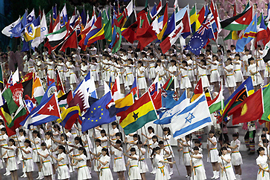Shanghai kicks off World Expo
China hopes multi-billion dollar event will highlight its rising global influence.

Relocation
World leaders, including Nicolas Sarkozy, the French president, attended the opening ceremony.
The Chinese government spent eight years and more than $50 billion preparing for Expo Shanghai 2010, the country’s first world’s fair, which aims to showcase the latest technology and inventions through innovative or radical national “pavilions”.
| factbox: SHANGHAI world expo | |||||||||||||||||||||||
Source: Reuters |
The main site has been designed to be environmentally friendly with the creation of the country’s largest solar plant and the use of zero-emission vehicles. However, most of the pavilions will be demolished after October 31, when the Expo ends.
The government also had to relocate thousands of people for the Expo, some forcefully, according to rights groups.
“The Shanghai Expo authorities should be mindful that many remember the 2008 Beijing Olympics as much for the arrests and detention of peaceful protesters and journalists as for the achievements of the athletes,” Sophie Richardson, the Asia advocacy director at Human Rights Watch, said.
Al Jazeera’s Divya Gopalan, reporting from Shanghai, said despite the billions of dollars that had gone into preparing for the Expo, more than what was spent for the 2008 Beijing Olympics, there is more to the event than meets the eye.
“This event is not only about showcasing China’s economic strength, it’s also about showing the country’s strength on the diplomatic front,” she said.
“Leaders of countries are here to build ties with China with the view to improving their monetary status and their diplomatic relations.
“If a country chose to not come to this event, it would be regarded as a snub towards China. As a result we have seen 189 countries, ranging from the US and Germany to North Korea and financially troubled Iceland and Greece, come to Shanghai, and many of them have spent lots of money on pavilions to show their support to China.”
Tight security
The government also launched the biggest security operation in China since the 2008 Olympic Games in Beijing in preparation for the event.
As a result, not all Shanghai residents are celebrating the event, which brings additional traffic restrictions and security checks across the city.
“The traffic restrictions are not convenient for Shanghai residents but in the future, it will bring Shanghai many business opportunities,” Xu Qing, a local resident, said.
| in depth | |||||||||||||||||||||||
|
An additional 8,000 police officers have been brought in to help Shanghai’s 46,000-strong police force to patrol the city, according to Xinhua, the official Chinese news agency.
An estimated 70 million people, mainly Chinese, are expected to tour the giant exhibition site, as Shanghai hopes to recreate the glamour of an event that was traditionally seen as one of the most prestigious international events before the rise of the Olympics.
Shanghai allocated $45 billion to upgrade the city’s infrastructure, creating the world’s longest metro system, two new airport terminals and a $700 million promenade on the historic Bund as well as new roads, parks and bridges.
“They have certain expectations of the international audience,” Bo Zhiyue, a Chinese politics expert at the National University of Singapore’s East Asian Institute, said.
“They are trying to boost their international image by trying to doing what they think will meet the expectations of foreigners.”
The first world fair was held in London’s Hyde Park in 1851, in the landmark Crystal Palace which was later destroyed in a fire.
The 1889 Paris Expo saw the creation of another famous landmark as French structural engineer Gustave Eiffel presented his Eiffel Tower as a tribute to
developments in science and engineering.
For China’s 1.3 billion people, powering an economy likely to soon overtake Japan as the world’s second-largest, the outcome of the Expo will be cast as another display of the Communist leadership’s power and prestige.

